
Microsoft targets enterprises in India with Surface Laptop Studio, priced Rs 1.57 lakh onward


Microsoft India has launched the Surface Laptop Studio in India, claiming to offer desktop grade performance within a convertible laptop form factor. The company is largely targeting enterprises with the Surface Laptop Studio, while also offering two stock-keeping units (SKUs) for consumers. Prices for the new laptop-tablet hybrid begin at Rs 1.57 lakh in the country, and go all the way up to Rs 3.43 lakh for the top commercial variant.
In terms of what the new device brings to the table, the Microsoft Surface Laptop Studio is powered by 11th gen Intel Core H-series processors, with the base SKU starting with an unspecified Core i5 processor and going up to Core i7 variants. The laptops offer 16GB or 32GB of RAM, while storage choices include 256GB, 512GB, 1TB and 2TB SSDs. The laptop also offers discrete GPU configurations, with the India price listing showcasing only two models – both in the enterprise range – featuring the Nvidia Quadro RTX A2000 GPUs.
The Surface Laptop Studio also features a 14.4-inch PixelSense Flow touchscreen display with 120Hz refresh rate, and comes with four speakers with Dolby Atmos certification.

The flexible form factor is the key feature of the Surface Laptop Studio. Users can use it as a conventional laptop, while a custom hinge offers a convertible form factor where the display swivels forward. A ‘stage mode’ allows users to prop up the display at an angle, which Microsoft says can be used for presentations. The ‘canvas mode’, meanwhile, converts the laptop into a tablet, although it does not appear to lie entirely flat due to the design of the hinge.
Consumers looking at the Surface Laptop Studio can either buy the Core i5 SKU with 16GB RAM and 256GB SSD, or the Core i7 SKU with 16GB RAM and 512GB SSD. Neither, however, offer the discrete GPU. According to Microsoft India’s launch statement, the users that the company is targeting with this new hybrid laptop are “developers, creative pros, designers, and gamers.”
